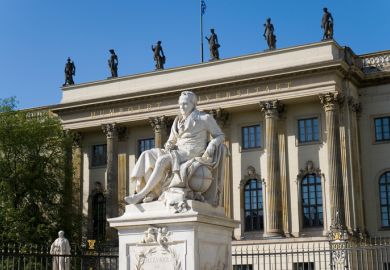This is a thoroughly well-intentioned and worthy book, but it is perhaps the ultimate example of "yes, but". It cunningly avoids calling itself "How the European heritage underlies the Americanisation of the world", but of course that is what it is about; and if it emphatically rejects President George W. Bush's dangerous delusions about the imposition of American values, it does not avoid the wish to spread less dangerous liberal American delusions.
John Headley takes as axiomatic that there are three "exceptional" developments of "our" civilisation (here exceptional means both "distinctive" and "benign"). They are modern science and technology (what Gellner has called a "culture-transcending knowledge" that works as a sort of cognitive replumbing of the people of the globe); a programme of natural human rights conceived in the Renaissance and reaching maturity in the Enlightenment; and the faculty for self-criticism, a political system that recognises the virtues of political pluralism and grew out of the attainment of religious pluralism in the early modern period.
Under this head, Headley celebrates the presence of a free press, independent judicial review, respect for the rule of law and the rights of minorities. He is enough of a liberal to see that the steep decline of each of these under the Bush regime makes its claims to promote "democracy" especially hollow. Indeed, his excoriation of Bush's America, in which he sees the universities as the sole bulwark against a new totalitarianism - God help America! - is one of the most passionate and moving I have read. But there are already enough problems in the selection of these three themes as the benign aspects of "a common modern civilisation in a vast planetary transformation" to justify my "yes, but" tag.
In essence, the book consists of three essays relating entirely to 1500-1800, with surrounding matter relating to the present. The first of Headley's three exceptional developments (that conceptual replumbing of the planet) is seen as the least debatable and as too obvious to need discussion. Yes, but ...
Instead we have a long chapter on the origins of the contemporary obsession with human rights and a much shorter chapter on the indubitable merits of pluralism, prefaced by a really good essay on "the Renaissance defining and engagement of the global arena of humanity" - how early modern Europeans came to see themselves as part of a global humanity as they explored and mapped the world.
As a study of the imperial and global motifs in a New Geography, this is unquestionably impressive both in its scope and in its control of large bodies of material. It is also pretty readable, unlike some of the latter sections, where the complexity of the ideas being discussed leads Headley's syntax to race beyond control. Thus, one paragraph contains 310 words but only five sentences, none fewer than 40 words, and one more than 110 words.
When we add problems of vocabulary ("a fractured representation of a truncated plasticity") you will see why I need to report that the energy of the reader is sorely drained by the effort of reading.
The two main chapters, looking at the Reformation and (classical) Renaissance origins of Enlightenment humanism are full of good things - however, the "yes, buts" are always there. The summaries of papal bulls preaching the redeemability of all mankind, the compassionate pleas of Vittoria, las Casas and Suarez, familiar enough, are neatly accomplished; the study of a strengthening sense of ius naturale as "what is justly due to someone" is well calibrated; the gradual impact of natural philosophy from Bacon onwards finds a plausible apogee in Pufendorf's secular civil ethic.
The chapter on "the emergence of politically constituted dissent", which is very English (leading into Madison and the US federalists) is less impressive. The account of English parliaments relies entirely on a 1948 book that was out of date at the time of its publication; and an account of how religious pluralism eases the way into political pluralism makes some large leaps of faith.
One also has to say that an 11-page "aftermath" is a slender basis on which to presume that these themes have blossomed into a mature set of post-Enlightenment human rights and into a benign pluralism. And behind even that lies the presumption that human rights are a good thing. Some of us think that the rhetoric of human rights does nothing for equality while promoting a notion of liberty that condones hedonism and rampant materialism. I would far rather read a book making the case for a Charter of Human Responsibilities that is binding on individuals, corporations and states. For a doctrine of human responsibilities limits our freedom to harm one another through selfishness while binding us to a radical notion of equality and human dignity. That is a globalising principle to which I could say "yes, and".
The Europeanization of the World: On the Origins of Human Rights and Democracy
By John M. Headley
Princeton University Press
308pp
£15.95
ISBN 9780691133126
Published 1 December 2007
Register to continue
Why register?
- Registration is free and only takes a moment
- Once registered, you can read 3 articles a month
- Sign up for our newsletter
Subscribe
Or subscribe for unlimited access to:
- Unlimited access to news, views, insights & reviews
- Digital editions
- Digital access to THE’s university and college rankings analysis
Already registered or a current subscriber?



